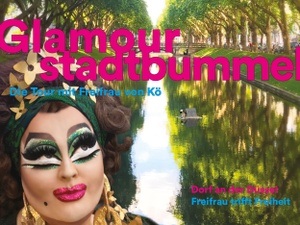Der Schneesturm
In the organizer's words:
"A snowstorm is a creature that peels off the skin of civilization." Vladimir Sorokin
Following its premiere at the Salzburg Festival on August 16, the international co-production by the Düsseldorfer Schauspielhaus can finally be seen at the Großes Haus from September 12.
It focuses on the journey of country doctor Dr. Garin to a remote village. His mission: to vaccinate the population against a mysterious plague that turns infected people into zombie-like creatures. In the absence of any other means of transportation, he sets off together with the coachman Perkhusha. The snowmobile is pulled by fifty grotesquely small horses. The deeper they penetrate into the snow-covered landscape, the more fantastic their journey becomes. As if straight out of a fairy tale, they encounter frozen giants, spend the night with a sensual miller's wife with a husband who is as tiny as he is vicious, and come across a group of dealers called dopaminers. After a drug trip and a near-death experience, Garin has a new appreciation of life. But they get deeper and deeper into the eponymous storm, and the road to salvation becomes a surreal struggle for survival.
As with Pushkin and Tolstoy, Sorokin's artfully composed puzzle is entitled "Метель" - and initially appears to be a condensation of the Russian snowstorm tradition. However, the story with a country doctor, coachman, dwarf horses and giants is not set in the past, but in a bizarre future that eerily mirrors our present.
Amidst snowstorms, hallucinations and homesick dreams, the line between reality and fantasy becomes increasingly blurred for Garin. The sleigh ride, which was only supposed to last seventeen versts, stretches into infinity. In the end, Garin fails: his coachman dreams of a beautiful butterfly and freezes to death amidst his horses. The doctor is picked up half-dead by a group of Chinese and transported away - a symbolic image of geopolitical shifts.
In Serebrennikov's production, the snowstorm itself becomes the third main character. With an ensemble of actors and musicians, dance and live projections, he transforms Sorokin's text into an ecstatic stage experience - polyphonic, seductive, disturbing. In the midst of an intoxicating whiteout, an existential cabaret between fairy tale and dystopia unfolds and leads the audience into a sensual loss of control.
Kirill Serebrennikov, one of the most important international voices in contemporary theater, opens the season with this literally fantastic text. Vladimir Sorokin is considered one of the most important Russian prose writers and sharpest critics of the Russian state. Since Russia's war of aggression against Ukraine, he - like Serebrennikov - has lived in exile in Berlin. August Diehl, a major figure in the German film and theater scene for two decades, can currently be seen in Serebrennikov's film "The Disappearance of Josef Mengele", which premiered at the Cannes Film Festival this year.














